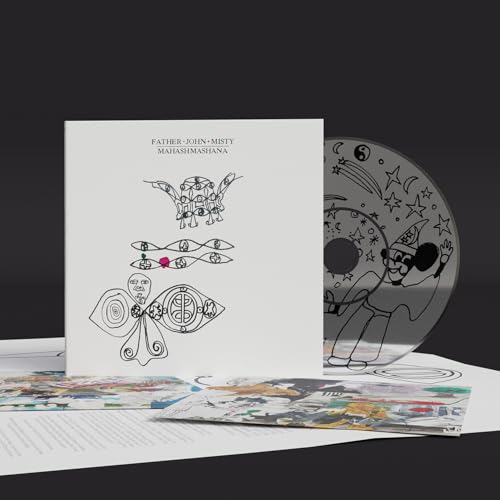
Father John Misty
Mahashmashana
Release Date: Nov 22, 2024
Genre(s): Pop/Rock, Alternative/Indie Rock
Record label: Sub Pop
Music Critic Score
How the Music Critic Score works
Buy Mahashmashana from Amazon
Album Review: Mahashmashana by Father John Misty
Very Good, Based on 8 Critics
Based on rating 4.5
If Josh Tillman intends this, one of his finest albums, to be a cremation ground for his persona, then it’s a hell of a way to go Mahashmashana is a Sanskrit word for a cremation ground, and it seems a very Father John Misty thing to name an album after that. Josh Tillman (as he’s presumably still known to his family and friends) has always been an artist who’s done things on his own terms, and his sixth album is as idiosyncratic as ever. It’s an album filled with lush orchestrations, sly references to mortality and rebirth (to fit in with the album’s title) and songs that are unafraid to go on for, in some instances, over eight minutes.
Based on rating 9/10
There has been some online speculation that Josh Tillman might sunset his sage but wisecracking Father John Misty alter-ego after his sixth album, Mahashmashana, which takes its name from the Sanskrit word meaning "great cremation pit." For Hindus, Mahashmashana is Varanasi, the holy city in India where there are death hotels that the dying check-in to check out. Their corporeal forms then set alight on funereal pyres. Their souls transcend.
Based on rating 8/10
By my decade-spanning brushes with his music, he should add in quite funny and often humorless. It's hard to keep a consistent authorial tone when the world you love and live within is crumbling in a tragically ironic, comedic display. Then again, glimmers of hope and various lights at the ends of emotional tunnels pepper his discography just like his "father's depression" salts and burns it.
Based on rating 7/10
However, the crossroad is here -- despite Tillman's attempts to dance around it. After solidifying a sound that worked on his first three albums, his last two have flirted with the idea of doing something new: God's Favourite Customer is a calmer approach, while Chloë and the Next 20th Century was a re-imagining of the golden age of Hollywood. The question, then, is simply stick or twist? Keep tinkering with what you have, or try something truly new? Mahashmashana answers this in the most Father John Misty way possible: Stick, with a twist.
Based on rating 1/10
The artist born Joshua Michael Tillman in Maryland in 1981 has seemingly led countless lives. Growing up in a strict Christian household where secular music was forbidden, he played drums in the post-rock outfit Saxon Shore and indie folk band Fleet Foxes, released a slew of rustic folk solo albums as J. Tillman, and eventually reinvented himself as Father John Misty (a moniker he’s admitted as being relatively meaningless).
Opinion: Fantastic
Some things in life are inevitable, taxes, love and of course death – a theme that is explored in stunning fashion across Father John Misty’s new album 'Mahashmashana'. It takes its title from 'Mahāśmaśāna', the Sanskrit word for 'great burial ground' and follows on conceptually from the last track of his previous album 'Chloë and the Next 20th Century' which references it with the lyrics 'Come build your burial grounds'. The genesis for this record originated after Josh Tillman (Father John Misty) read a book by Bruce Wagner called Memorial .
Opinion: Fantastic
Conciseness is not a concept that's ever been readily associated with Josh Tillman's work and it seems a strange word to associate with a record that unwinds gradually, deliberately, its eight tracks having an average length of over six minutes. And yet, something about 'Mahashmashana' feels succinct; there is a clarity of vision here, as well as a willingness to cut loose stylistically, that means it avoids some of the past pitfalls of Father John Misty records. It takes its title from mahāśmaśāna, the Sanskrit word for "great burial ground, all things put going thither", and into this particular furnace Tillman throws a smorgasbord of different ideas and melds something cogent from them.
Opinion: Very Good
Father John Misty is a withering social commentator who casts wry aspersions on the ludicrousness of modern life, often depicted in funhouse proportions with the aid of winkingly florid arrangements. Though he's more than eager to implicate himself in this clown show of a world--as on "The Night Josh Tillman Came to Our Apartment," from 2015's I Love You, Honeybear, where he proves lecherous and desperate enough to hook up with an pseud whom he spends the entire song excoriating--Josh Tillman's best writing is more observational than introspective. Tillman the cultural satirist and Tillman the gonzo diarist are both present and accounted for on Mahashmashana, and he often seems intent on reconciling the two.
'Mahashmashana'
is available now

